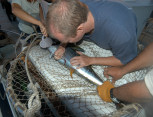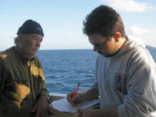Career information
Our graduates are equipped with the academic and practical skills needed to respond to a wide range of rewarding careers in marine sciences, a field where new jobs are expanding internationally due to continuing advances in technology and a growing appreciation for the importance of the oceans to all life on earth. Depending on their skills and ambitions, marine science graduates may find opportunities in academia, industry, government, non-profit organizations and consulting firms, or build their own businesses; in fact, the possibilities for a marine related career are as varied as one's desires and imagination:
Marine biology: Scientists in this field study the behavior, ecology, and interactions of plants and animals that live in the ocean, as well as their roles in the marine food chain. Just because there are so many topics within this field, many graduates select a particular interest and specialize on it, focusing for example on a particular species, organism, behavior, technique, or ecosystem.
Oceanography: Physical oceanographers study the ocean and its motion, from the gentle movements of ocean currents to the power of tidal waves. Geological oceanographers study the evolution of the seafloor and the minerals found there. Chemical oceanographers study the chemicals and chemical compounds in the oceans, as well as the level of pollution in the marine environment. And if that's not enough, you have people working on fisheries acoustics, bioacoustics and marine mammals. This is why some of the most important oceanographic discoveries have been made as a result of an integrated approach involving geologists, chemists, biologists, physical oceanographers, and engineers.





Aquaculture: This is science of farming of fish, shellfish, and seaweeds, and is another field that is gaining importance in Greece as consumer demand for fish and shellfish becomes greater than can be met by traditional commercial fishing.
Ocean engineering: Here you'll find those who design and build the instruments, equipment, vehicles, and structures used in marine exploration and research, including people like environmental engineers, designers, electrical and mechanical engineers, or software developers. Don't underestimate these guys; they are the workhorse of our research, playing a key role out in the field and within all successful research teams.
Economics, management, and other related fields: Whether you imagine yourself being good in underwater filmmaking, marine economics, environmental education, or resource management, our Department's degree will provide you with the groundwork needed to pursue your dreams. We will certainly not attempt to list all futher possibilities here, but here's a small part of it: ecotourism guide, beach superintendent, coastal or ocean policy consulntant, marine or aquatic animals expert, economist, marine archaeologist, marine historian, fundraiser or spokesperson, environmental planner, aquaculturist, coastal conservation manager, hatchery specialist... It is an ocean of opportunities.













